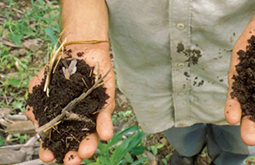Existing Soil Constraints vs Wheat/Barley in Narok
Healthy soils help grow our food, clean our water, store carbon, and reduce risks of droughts and floods.
 Narok is one among the big grain baskets in Kenya. Wheat, maize and barley are among the major cash crops grown in the area. Production of the above mentioned crops is in medium to large scale and rainfed. However, over the years, yield realized in tonnes per hectare (t/ha or bags/ ha) varies with famers despite replication of similar practices. As per the farmers growing wheat and barley in the area, yield vary from one farmer to another which means existence of an imperative scenario. Some people have suggested that this may be attributed to different crop husbandry and soil fertility management practices. Most commonly mentioned factors include: land tenure system, type of seed, soil correction where applicable and proper use of fertilizer in terms of composition, rates of application and timing. In trying to understand factors causing dwindling/varying yields, farmers and other interested parties have employed tools to precisely identify the major contributing factors. Soil testing is the is key to accurate and precise use of fertilizer. The tool seeks to reveal soil chemical, biological and physical characteristics from which useful information is deduced and the best management practices (BMPs) are recommended.
Narok is one among the big grain baskets in Kenya. Wheat, maize and barley are among the major cash crops grown in the area. Production of the above mentioned crops is in medium to large scale and rainfed. However, over the years, yield realized in tonnes per hectare (t/ha or bags/ ha) varies with famers despite replication of similar practices. As per the farmers growing wheat and barley in the area, yield vary from one farmer to another which means existence of an imperative scenario. Some people have suggested that this may be attributed to different crop husbandry and soil fertility management practices. Most commonly mentioned factors include: land tenure system, type of seed, soil correction where applicable and proper use of fertilizer in terms of composition, rates of application and timing. In trying to understand factors causing dwindling/varying yields, farmers and other interested parties have employed tools to precisely identify the major contributing factors. Soil testing is the is key to accurate and precise use of fertilizer. The tool seeks to reveal soil chemical, biological and physical characteristics from which useful information is deduced and the best management practices (BMPs) are recommended.
Soil testing results in some problematic pockets in Narok have exhibited the following soil related constraints: low soil pH/strongly acidic, nutrient imbalance and deficiency/low nutrient content. Wheat and barley are not particularly sensitive to soil acidity. However, when the soil is strongly acidic (pH<4.8) this affects nutrient availability most especially phosphorus (P) and cause toxicity of Manganese and Aluminum. In acidic soils, the applied P form in soluble complex compound with Fe & Al oxides/ hydroxides making it unavailable for uptake by the crop. Solubility of Manganese (Mn) and Aluminum (Al) in the soil increase with decrease in soil pH. Thus, these elements eventually become toxic to the plant roots causing a decline in crop growth. Aluminum toxicity is a major limiting factor of barley production in acidic soils.
Continuous cropping with little or no replenishment of the removed nutrients lead to soil depletion. Worth noting, different crops remove different amounts of essential nutrients. This together with other unquantifiable loss of nutrients cause their imbalance in the soil system. Some of the established nutrient imbalance include: high percent exchangeable potassium and sodium in relation to other essential cations Calcium (Ca++) and Magnesium (Mg++). High percent exchangeable potassium (%EPP) induce deficiencies in Mg and Boron (B) while high percent sodium affects the integrity of soil aggregation.
The cumulative effect of the above mentioned has significant influence on crop growth. This is through developing the following attributes in our natural soil system: poor aeration in the root zone, water movement, moisture distribution in the ploughed soil layer, reduced microbial population among others. The result in the eyes of the farmer is reduced yield which has rendered production of these crops unprofitable and hence abandonment of the economic activity. Worth noting, most soil correction practices are expensive and the benefits are realised over a long period and therefore for the practices to be adopted land tenure system is a factor of vital importance. An irrevocable/binding land tenure system will enhance a sustainable use of land resource.
Is the situation remediable? The answer is yes, and how? Several practices are mandatory to enhance sustainability. They include: liming of acid soils, maintaining soil organic carbon levels at desired levels (≥2%) by returning crop residues and application of animal/compost manure in adequate amounts, crop rotation and above all farmers to make soil testing a routine practice to ensure there is early detection of existing or developing nutrient imbalance in our soil system and timely/proper correction measures are employed.
Benson Kibiru-Lead Soil scientist/Agronomist